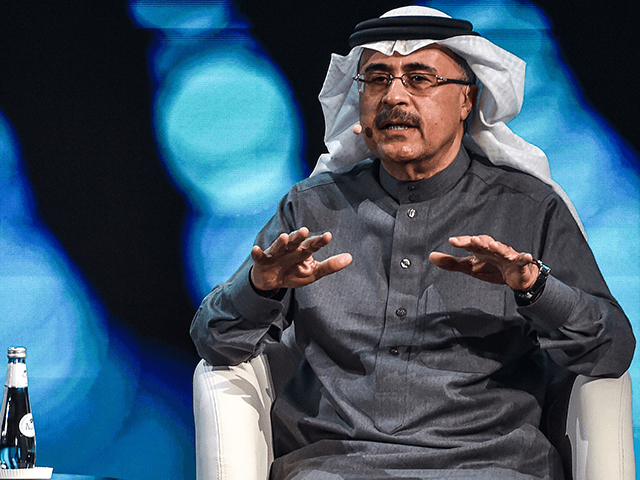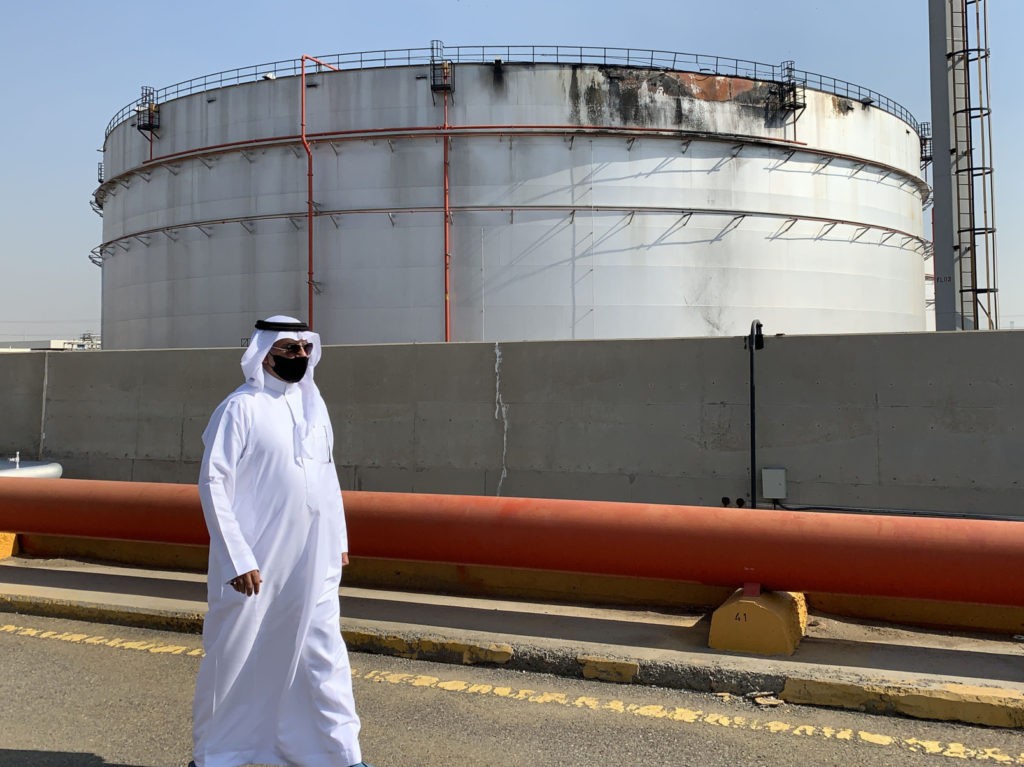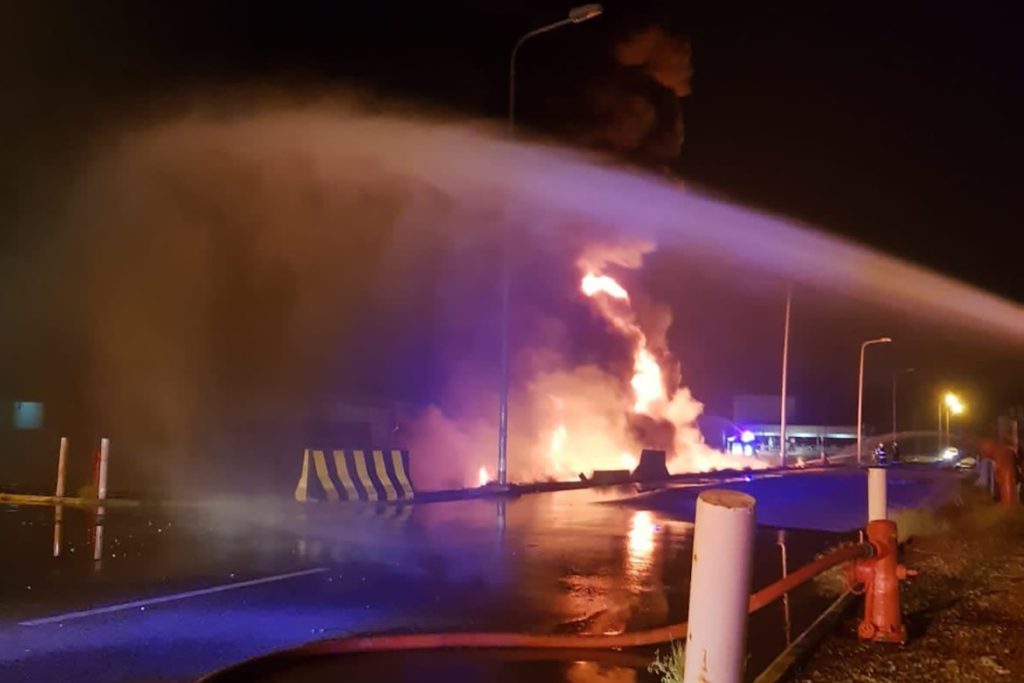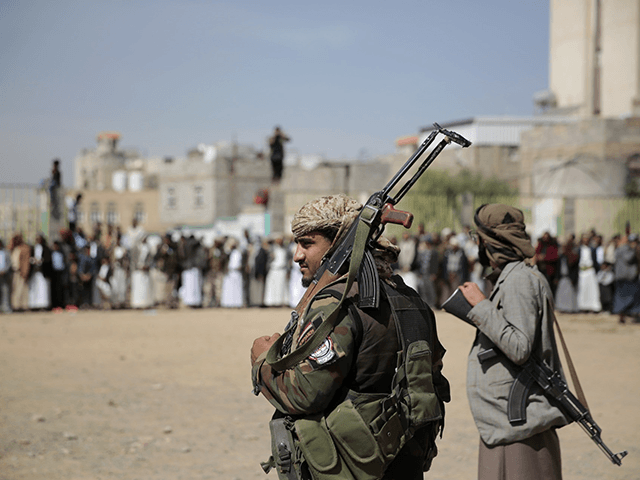Amin Nasser, CEO of Saudi Arabia’s national oil company Aramco, said Monday the world had better begin paying close attention to the relentless terrorist attacks on Saudi oil facilities launched by the Iran-backed Houthi insurgents of Yemen, because Houthi mischief could make it difficult for the Saudis to increase oil shipments in response to global demand.
Nasser took the opportunity of an Aramco earnings webcast on Monday to elaborate on the Saudi Foreign Ministry’s warning that the kingdom will not be held responsible for oil market disruptions caused by Houthi attacks.
“The message that came out highlighted that these types of attacks and that type of escalation during a time when the market is very tight is a real concern for the world for it will have – God forbid – if more escalations happen over time, it might have some impact on supply,” Nasser said.

Amin Nasser, president and chief executive officer of Saudi Aramco, speaks during the fourth edition of the Future Investment Initiative (FII) conference at the capital Riyadh’s Ritz-Carlton hotel on January 27, 2021. (FAYEZ NURELDINE/AFP via Getty Images)
A Foreign Ministry official said Monday that Houthi attacks could “threaten the safety and stability of energy supply to the global markets.”

A man walks past a damaged silo at the Saudi Aramco oil facility in Saudi Arabia’s Red Sea city of Jeddah on November 24, 2020. Yemen’s Huthi rebels launched a missile attack on the facility on November 23, triggering an explosion and a fire in a fuel tank, officials said. The strike occurred the day after the kingdom hosted a virtual summit of G20 nations, and more than a year after the targeting of major Aramco sites that caused turmoil on global oil markets. (FAYEZ NURELDINE/AFP via Getty Images)
The Foreign Ministry therefore asked the international community to “firmly” oppose the Houthis and put a stop to their “destructive attacks that pose a direct threat to the security of petroleum supplies in these highly sensitive circumstances that global energy markets are witnessing.”

In this photo provided by the Saudi Press Agency, firefighters try to extinguish a blaze at an Aramco terminal in the southern border town of Jizan, Saudi Arabia, early Sunday, March 20, 2022. Yemen’s Houthi rebels unleashed a barrage of drone and missile strikes on Saudi Arabia early Sunday that targeted a liquified natural gas plant, water desalination plant, oil facility and power station, Saudi state-run media reported. (Saudi Press Agency via AP)
“The kingdom stresses the importance of the international community realizing the gravity of Iran’s continued behavior of equipping the terrorist Houthi militias with the technology of the ballistic missiles, and advanced UAVs with which they target the kingdom’s production sites of oil, gas and refined products,” the Foreign Ministry said.
Aramco and the Saudi government took pains to assure oil buyers that Sunday’s barrage of missile, drone, and exploding-boat attacks by the Houthis did not seriously compromise oil production or exports.
Nasser was more clearly restating the Foreign Ministry’s message that Houthi attacks certainly could wreak havoc upon the already-tight world oil market. The Houthis seem interested in sending that message since their attack came on the same day Aramco promised it would increase production to cover shortages created by the Russian invasion of Ukraine.
The Associated Press on Tuesday pointed to satellite photos that showed Monday’s Houthi strikes damaged the same Aramco storage tank in the city of Jeddah that was hit by a Houthi cruise missile in November 2020.
The tank is located within the North Jeddah Bulk Plant, which handles about a quarter of Saudi Arabia’s liquid fuel supplies, including the fuel for a vital water desalination plant. The specific tank repeatedly struck by the Houthis can hold up to 500,000 barrels of diesel fuel.
Diesel fuel happens to be in especially short supply in Europe and the United States at the moment, as Russian diesel refineries cut back on production, and European buyers grow wary of signing contracts for Russian products.
After the November 2020 Houthi attack, a panel of U.N. experts certified the North Jeddah Bulk Plant as a “civilian target,” and warned that if it was rendered inoperable, “the impact on the kingdom’s economy as well as on the welfare of the residents of the Western region would likely have been significant.”

COMMENTS
Please let us know if you're having issues with commenting.